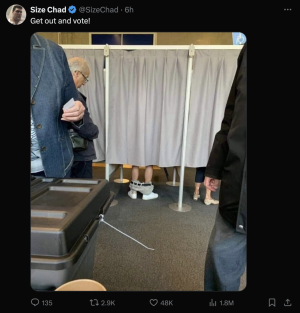to clarify by by "not engaged" I don't mean "don't ever vote"
I just mean not super keyed into politics or consuming political news or content.
not voting is a proxy for "not engaged" but not engaged people sometimes vote.
Okay, fine, that makes a whole bunch more messy
So you are saying "non-engaged" white people with racial animus include non-voters and sometimes voters. And you agree when white people with racial animus vote, they tend to vote conservative more often than not, by a large margin.
Seems to me that the behavior of the voting sample would give insights into the non-voting population.
The key difference you are trying to say is political engagement. I don't see that as strong enough of a difference to make me believe white people with racial animus are not on aggregate conservative.
Because your argument implies that non-politically engaged white people with racial animus, that does end up vote, tend to split their vote equally between liberal and conservative candidates. (Given you have not identified any major difference between the ones that do and don't vote)
That seems like a massive guess, one I would I would think that was wrong. Limited evidence suggests it is wrong.
I think conservatives win these voters. Not by the margins they win the overall racial animus white vote, or the overall white vote, but they still win it. Maybe if it were the 90s I would be more open to it.
But I will admit, that would be a tough thing to measure. Since you would have to use a proxy for racial animus. One that primes any underlying racism when surveyed.
my intuition, is that it's harder to break this down on conservative / liberal lines.
like is the guy who thinks Ukraine is getting too much money,
welfare recipients shouldn't get junk food
more immigration is good.
and taxes on the rich good.
is that person a conservatives? I don't think it's as easy to place non engaged people, because there politics are more irrational and in coherent.
My intuition tells me a majority white from Appalachia on aggregate tend to be conservative. Even though they often espouse support for policies normally associated with the left. The Democrats left me behind is like their rallying cry.
It seems like you want to strip away a ton of context that might motivate someone's assumptions to just look at dude's words like they were written on paper. Where it is coming from had something to do with people's initial assumptions.
People make assumptions because of past experiences and observable reality.
Like do you think if turnout in rural white America went to 100%, the partisan lean of these areas would be more liberal? Because that is what your argument implies.
People have incoherent political views, are pressured, and still be on aggregate conservative. I mean we have a major example of this happening with another group, libertarians.
I simply don't think Oliver Anthony types are as representative as you make him out it be.
But of course they exist.









































